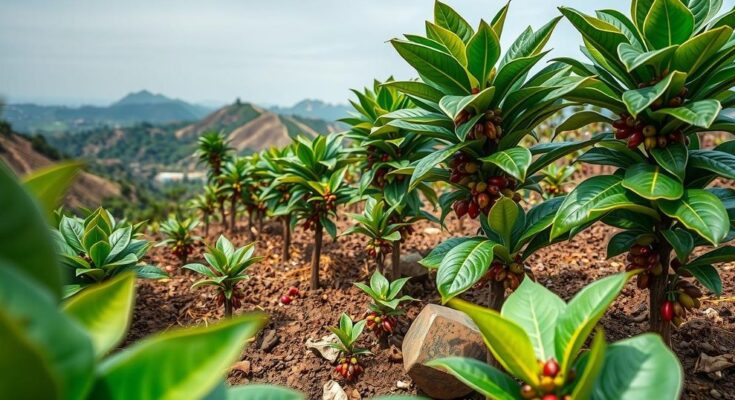Catherine Bashiama in Nzara County, South Sudan, cultivates excelsa coffee, a climate-resistant variety aimed at alleviating her family’s poverty. This species, though only a small fraction of global coffee, presents a unique opportunity amidst climate change pressures on traditional growers. While local efforts face challenges from instability and infrastructure, coffee farming is seen as a pathway to economic independence for communities in South Sudan.
In South Sudan’s Nzara County, Catherine Bashiama is nurturing future coffee crops, having planted a climate-resilient species three years ago. Striving to improve her family’s standard of living, she aims to send her children to school. Discovered over a century ago, excelsa coffee is now garnering attention amidst a global coffee crisis driven by climate change, as traditional producing countries face severe challenges.
Excelsa coffee, indigenous to South Sudan and several African nations, is recognized for its resilience against drought and pests, yet it accounts for less than 1% of global production, trailing behind arabica and robusta varieties. Experts emphasize the need for wider cultivation to address market deficits caused by climate-related challenges.
Historically, South Sudan was not prioritized for coffee cultivation like its neighbors Ethiopia or Uganda, largely due to conflict that hindered agricultural efforts. Residents in Nzara County recall a rich history of coffee farming, yet many younger individuals lack direct experience with the crop, identifying excelsa primarily by its physical characteristics without acknowledging its importance.
Excelsa coffee offers a distinct taste profile, combining sweetness with hints of chocolate and dark fruits, reminiscent of arabica but generally less bitter. Ian Paterson, managing director of Equatoria Teak, highlights ongoing research into excelsa’s stability. The company is involved in community trials to revive coffee farming, having previously supplied seedlings and training to aspiring farmers, including Bashiama.
The challenges of securing exports from unstable regions like South Sudan are significant, with logistics costs skyrocketing. The journey from the producer to the port in Kenya can be arduous and expensive, often deterring potential investors. Despite a peace agreement in 2018, sporadic violence disrupts operations and diminishes confidence in the region’s stability.
Local farmers, however, view coffee cultivation as a pathway to economic self-sufficiency. The stories of individuals like Bashiama and Taban John reveal aspirations for financial independence through coffee production. There is a collective recognition that, to harness the potential of excelsa coffee, stability and long-term commitment from the community and government are essential.
Elia Box exemplifies the perseverance of farmers facing setbacks like crop loss due to fires, highlighting the need for a commitment to coffee cultivation amidst ongoing conflicts. He articulates the sentiment that, “Coffee needs peace,” underscoring the conflict’s impact on agricultural planning.
In conclusion, the promotion of excelsa coffee in South Sudan presents a viable opportunity for economic improvement and community revitalization. Despite multiple challenges, including climate impacts, infrastructure deficits, and the need for stable governance, local farmers are motivated to invest in coffee cultivation, seeking to achieve financial independence. Achieving these goals will depend on sustained efforts to cultivate this resilient coffee species and to foster a favorable environment for agricultural development.
Original Source: www.seattletimes.com




